Instagram Launched Pia Arrobio, Twitter 'Canceled' Her, Here's What Happened Next
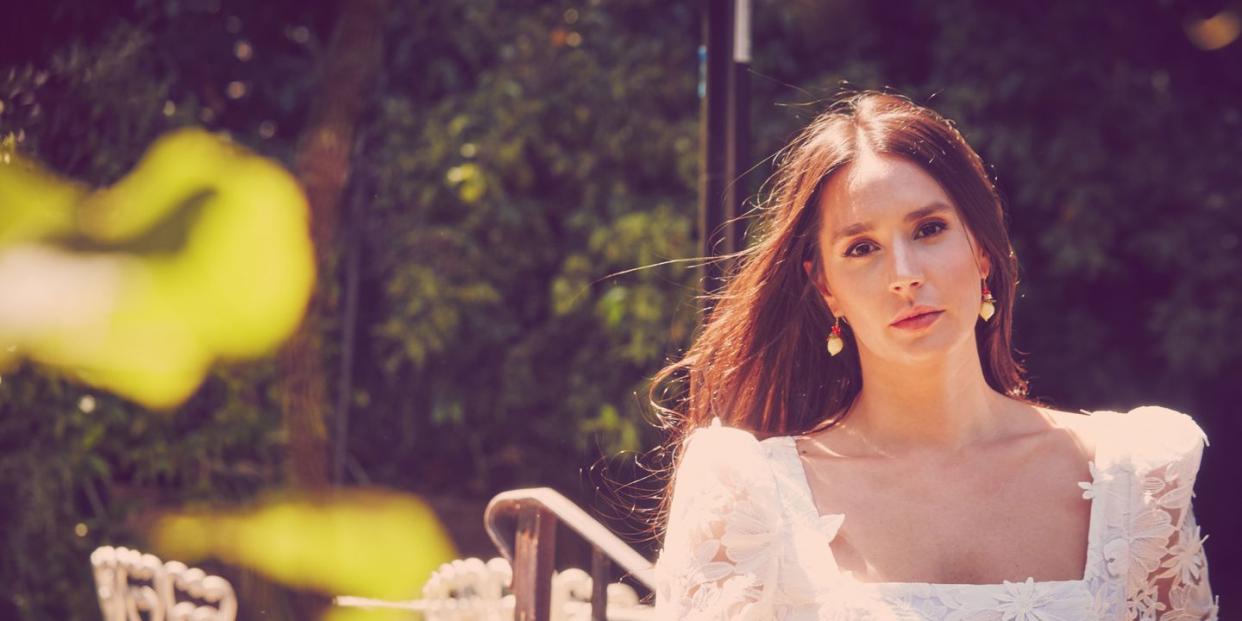
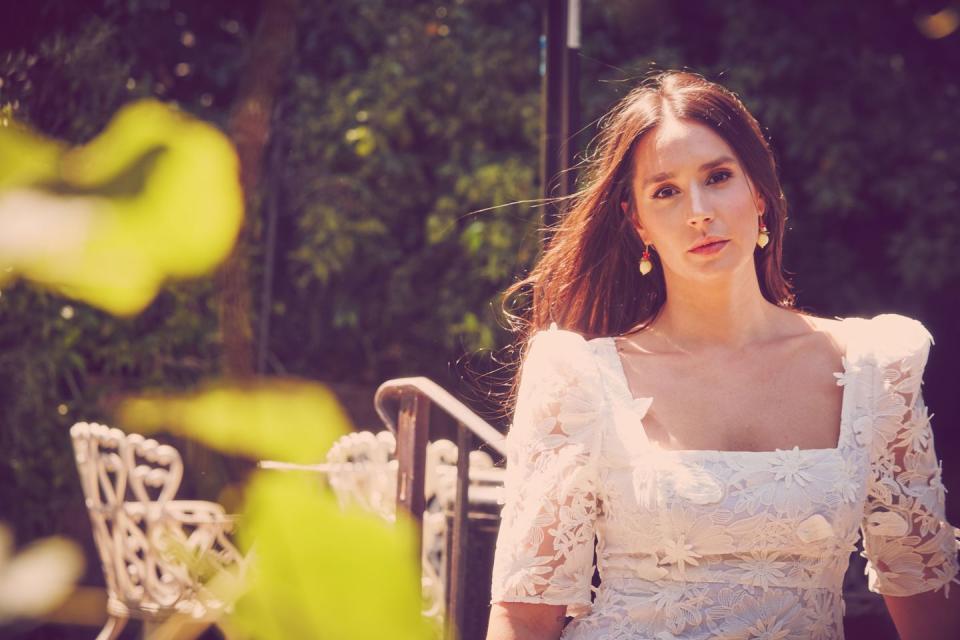
Lara Pia Arrobio Baroncini looks like a normal girl using Instagram until you’re up close, peering over her shoulder, when she’s more like a sushi chef with ten tiny knives. Her oblong red nails move faster than your eyes can follow, although she seems only half paying attention, snacking on almonds and rapping on an empty bottle of Real Water. Responding to a shipping question takes seven seconds. Posting a story, half a minute. Scrolling — the self-restraint! — three minutes. When a shoppable link for Pia’s three-year-old fashion brand, LPA, is broken, a perfectly shaped tip jabs it, as if trying to motivate a sluggish limb.
We’re on the first of 11 stories of showrooms and offices in a tower in Los Angeles’ downtown fashion district. It’s an office of Revolve, LPA’s corporate parent. On the wall is a printer-paper preview of a September collection: puff-sleeved taffeta top with velvet polka dots, lacy catsuit, mini skirt in leopard print. Pia’s at a nearby conference table.
Because it’s about to be hot and you want to be chic, yet comfy, love you, she types, then posts. “I don’t think about it too hard,” Pia says, as the photo of strappy white sandals racks up thousands of likes. “My fucking phone’s about to die.”
Over the course of our two days in and around Los Angeles, Pia says “fuck” a total of 201 times. She does her makeup in the car without a mirror, talks openly about Botox, and calls her gynecologist while on a photo set with a dozen colleagues plus a reporter. It’s all charming and unfiltered, and the reason 300,000 people keep up with her and her brand online. Some of them also buy her clothes.
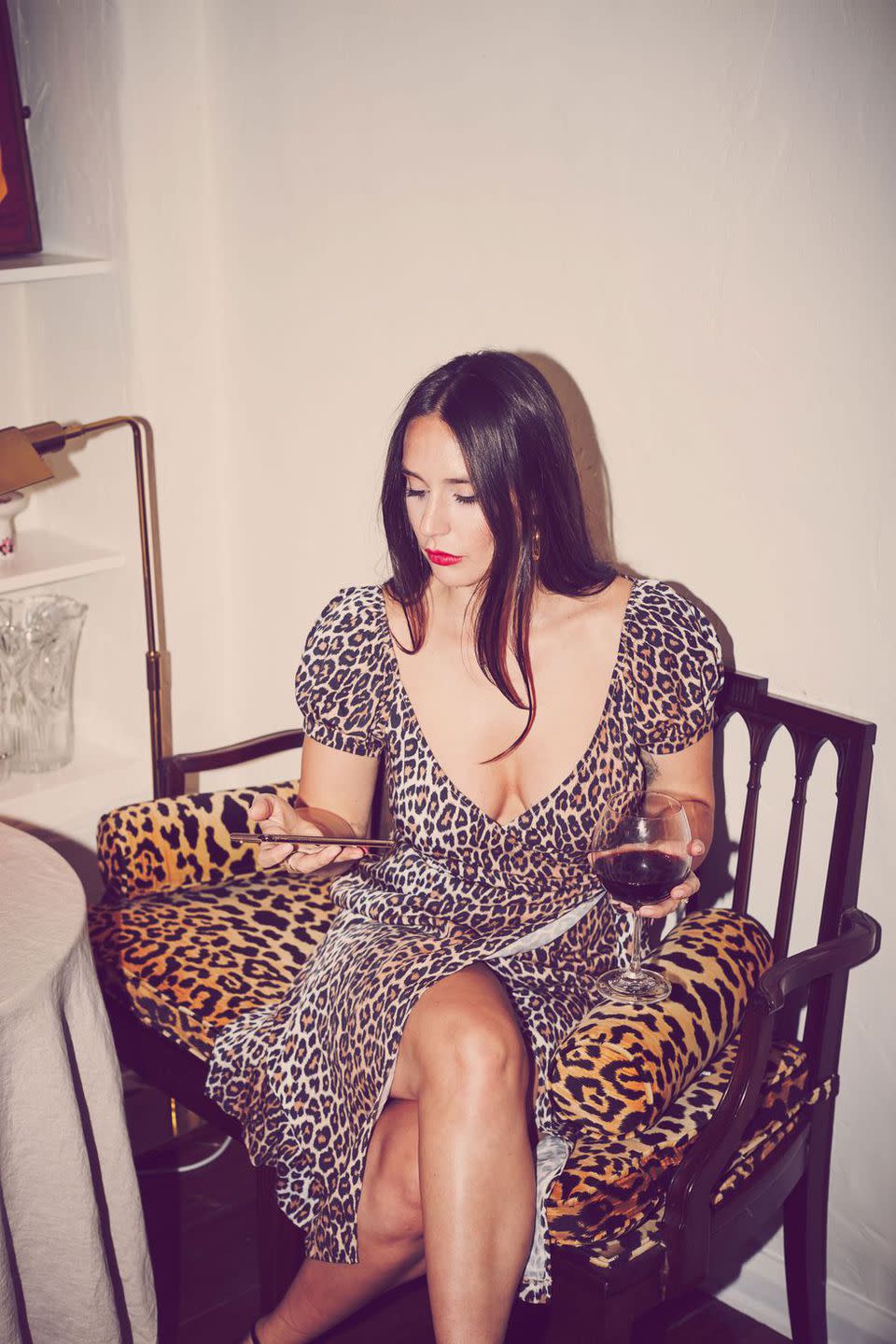
LPA, which takes its name from Pia’s pre-marriage initials, is what the retail industry calls mid-market, and what one comment I find online calls “Forever 21 for girls who can afford vacations to Mexico.” LPA’s sizes range from XXS to XXL, and are expanding. A swimsuit goes for $128, a dress for $228. It’s trend-aware but built to last a few seasons, pretty without being distracting, sexy but not sloooty, a Pia-ism. In an era when department stores shutter every year and the rag trade is increasingly polarized between luxury and discount, LPA is profitable. Sales doubled last year, according to Pia.
Along with Tyler Haney of Outdoor Voices, and Emily Weiss of Glossier, Pia is a member of an emerging class of female founders whose jobs involve wearing many hats, relatably. Pia is not quite an influencer, although she lives an aspirational life online, with appearances by famous friends like Erin Wasson and Emily Ratajkowski. Entrepreneur also doesn’t seem like the whole story, although that’s what her social media bio reads. Neither is she a professional print designer nor a photographer. Her talent lies in doing all of the above, and broadcasting it in a way that makes it seem like you could do it, too. LPA handbags are photographed against a backdrop of Pia’s grandmother’s dusty tchotchkes. Expensive skincare regimens are obsessively documented even when they give her breakouts. Phrases like Relax, you look great are printed on the tags inside LPA swimwear.
“I grew up a chubby girl with big eyebrows, and then working in fashion and a size 8, barely fitting into anything,” Pia tells me. “It made me feel like shit. Now if I say that on social I'll be attacked because everyone's like, size 8 is small!”
Being the relatable and available face of a brand has its costs. When there are hiccups — and there have been hiccups — Pia must be ready to roll with the punches publicly.
In September 2018, LPA released a line of sweatshirts emblazoned with troll quotes sourced by Pia’s famous friends from their Instagram comment sections. Lena Dunham contributed “Horrible Result of Modern Feminism”; Cara Delevingne “Too Boney to be Boned.” LPA envisioned the sweatshirts would promote body positivity, raise money for charity and “shine a light on the darkness of the internet.” But when the garment printed with a comment plus-size model Paloma Elsesser once received — “Being Fat Is Not Beautiful It’s an Excuse” — appeared on Revolve.com on a stick-thin model (with exactly zero context about the project) it went viral. Elsesser denounced LPA—“I am disgusted with the ignorance of what transpired,” she wrote— and Revolve and Pia cancelled the line of sweatshirts.

In a frantic DM with one of her critics, Pia explained that on LPA’s own site the sweatshirts had been slated to appear on the women who submitted the quotes; the rollout happened prematurely. “It’s basically the exact opposite of what it seems,” she wrote. In her first interview since the debacle, Pia emphasized that she was unaware of how Revolve would photograph the sweatshirts. (Revolve denied this.) But she also blames herself. “Our culture moves too fast, and it's really hard to think about every detail that could be misconstrued when you’re creating things nonstop,” she says. “I take full responsibility for moving too fast.”
LOLLLLL @REVOLVE y’all are a mess. pic.twitter.com/CrzOkd5oE4
— Tess Holliday 🥀 (@Tess_Holliday) September 12, 2018
Fashion vigilante Diet Prada (1.3 million followers) used the controversy as a peg to dig into Pia’s past: a photo of her dressed in a hijab from a Halloween of yore (“#lpa #whitefeminism #cancelled”), another of an old birthday cake seeming to joke about bulimia. The call-out was unusually personal, even on an account where crimes of political incorrectness often overshadow crimes of fashion. When a Gucci sweater with exaggerated red lips intended to evoke performance artist Leigh Bowery reminded audiences much more of blackface, Diet Prada’s write-up didn’t mention Gucci design chief Alessandro Michele, instead using the incident to critique “global brands” for a lack of diversity.
Gucci isn’t a one-human show. LPA effectively is, although Pia has two full-time employees and works with dozens more employed by Revolve. If LPA were Chanel, Pia would be Karl Lagerfeld, Karlie Kloss, and the social media and customer service staffers all rolled into one stressed-but-smiling #bossbabe. Pia declines to comment on Diet Prada.
But there was a curious side-effect to the sweatshirt controversy. We are sitting on a photo set, waiting for a model who is hours late, R&B playing in the background, when I ask whether LPA lost followers. “The exact opposite,” she says. “Sold out of everything.” Not the sweatshirts, of course, which had been pulled from digital shelves. But as for LPA’s many other offerings, the backlash amounted to unpaid publicity. “Really fucking crazy,” Pia says, “and no one knows that.” (Revolve declined to confirm sales numbers for LPA.)
The sales were hardly cause for celebration. “It was devastating,” Baroncini says of the backlash. “I felt like I was a sacrificial fucking lamb or something.” Pia admits that her friendships with some of her famous sweatshirt collaborators have yet to recover, and she’s still press-shy. (“I just can’t handle a bad piece about me,” she says at one point, with characteristic drama and irony. “I'll kill myself. No pressure.”) A few weeks later she’ll vent about the mental health effects of social media pile-ons. “SEEING THE WORD CANCELLATION NEXT TO A HUMAN BEING'S NAME IS WRONG,” she wrote in a rabble-rousing Instagram post about the beauty YouTuber James Charles.
To assume LPA is only as good as Pia’s friends risks underestimating Pia. When LPA launched three years ago, Pia was quickly propelled to the top of listicles with titles like “Influencers with Famous Friends You Need to Follow” — much to her chagrin. But in this city of vlogger mansions and Superblooms crushed under the weight of Balenciaga sneakers, followings bigger than Pia’s regularly birth brands with less success. “There are people who like do collabs and start a Pinterest board and go into the office a couple times, but this is not what this is,” she tells me. “I fucking worked. And I put my work on my Instagram.”
When Pia heard about the sweatshirt controversy, she was in New York to host a launch party for the collection’s release. In the end, she didn’t leave her hotel room for days. “Thank god the guy who worked downstairs kept sending me coffee and tequila,” she recalls.
The reclusion was interrupted by her fiancé, luxury Italian menswear designer Davide Baroncini. He phoned to say his mom, who had been very recently diagnosed with stomach cancer, was on her deathbed. He wanted to cancel their wedding, scheduled for October, the following month. Pia spent the next few weeks in an Italian hospital, surrounded by families crying in a language she didn’t understand. “I was just like, wow, okay. My whole world is collapsing.”
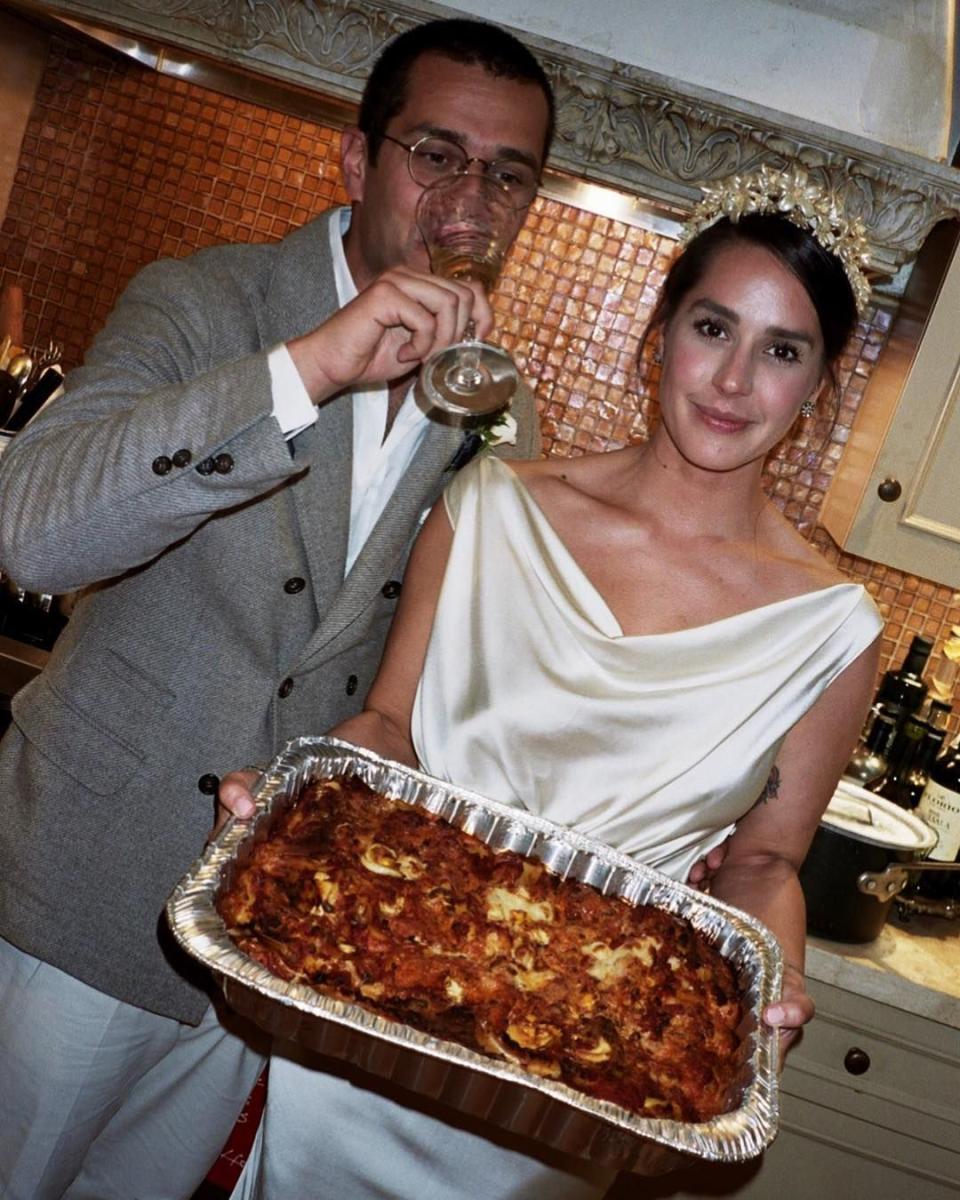
2018 had been a rough year already for Pia. In March, her dad had died suddenly. Soon after, Pia and Davide moved in with Pia’s mother into Pia’s childhood home outside Los Angeles, in Pasadena. All the way through the ups and downs, Pia never went dark. “Happy whatwasupposedtobeourweddingday,” read one Instagram post from October that year. “I wanna make an extra effort to be present not only for myself but also for those closest for me,” read another, an #ad for Evian.
“Keep your head up Pia!” wrote one commenter. “I’ve been following you since before the launch of your line, and you're definitely not who these mean people think you are!!!”
One morning, I visit Pia in Pasadena. The smell of garden lilies nearly knocks me over as I ring their doorbell, before one of the three Baroncini dogs takes over. On Instagram, the household is regularly mined for multigenerational, multilingual comedy—in equal parts at the expense of Pia’s mother and Pia herself, whose Italian is so-so. In real life, Pia’s grandmother’s crochet potholders share counter space with a staggering collection of gifted wellness swag. Pia’s laugh, contagious and loud, can be heard from anywhere in the house.
After attending high school nearby, Pia studied design and management at Parsons in New York. She documented the years on a blog called Fighting the War Against Blowing It, which snapped skateboarders and barflies at Max Fish and The Beatrice Inn and “wrote very honestly about people who I thought were my friends who were clearly not my friends and guys breaking my heart.” It offered an early taste of internet notoriety, and junior year, fed up with the cost of higher education, she dropped out to join People’s Revolution, the downtown fashion PR firm.
“She had lots of charisma and good pop-culture instincts,” says Kelly Cutrone, her boss there. “A great heart, scrappy as fuck. It’s a natural evolution from PR to do what she does now. You could be a great publicist, or say fuck this shit, if they can’t get the story right I’ll do it for them.” Afterwards came a job at Reformation, the cool-girl ethical fashion line. Pia started in PR when the company was a tiny start-up, then did store management, marketing, design, eventually becoming Creative Director.
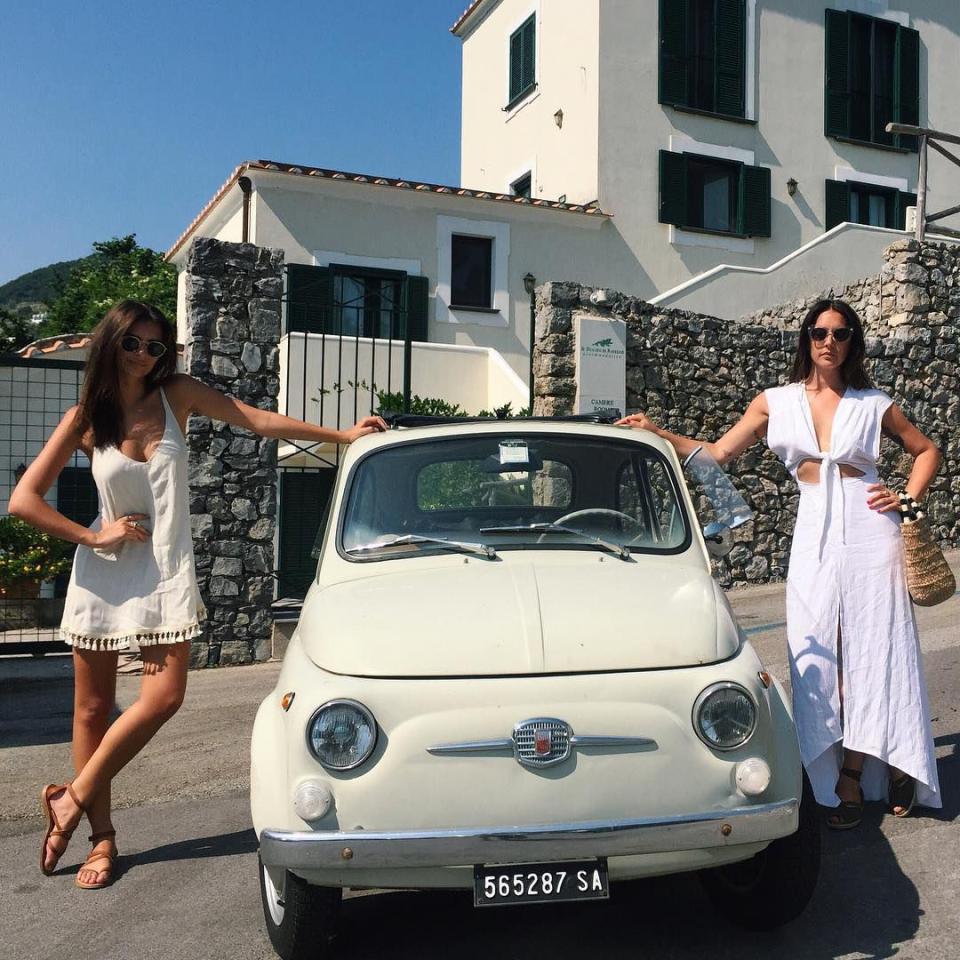
Before my interviews with Pia, I had been prepped by pretty much everyone — from past profiles to my yoga teacher down the block— with a story about what happened next. Pia went on lush and well-documented 2015 Italian vacation with Ratajkowski, the story went, and out of the internet ether floated a Ready-Made Brand, assembled by the retail conglomerate with production lines to spare and creativity to gain. Early on, Pia described LPA as “Dolce & Gabbana meets Supreme.” But these days, the brand seems to exist more between this leafy L.A. suburb and Sicily, from where her now-husband Davide hails.
Pia’s 1994 Range Rover is parked outside the house, which, in a typical day, will take her to and from the Revolve offices in downtown Los Angeles and in Cerritos, a suburb, photoshoot locations, and evenings with friends. “I can’t wait to spend the next three years filling this with kids and dogs,” read a recent Instagram caption about the car, with her characteristic knack for publicly emoting on topics many women feel uncomfortable discussing with their closest friends.
Recently, Pia was invited to give a marketing lecture at the University of Southern California, a school which rejected her college application. She took the invitation as evidence of a belief that’s controversial among her friends: “Instagram is evening the playing field for a lot of people,” she summed it up to me. The common narrative — that the platform encourages fakeness and lowers users’ self-esteem — is too simple, per Pia. “I think either we should go deeper into making Instagram work for us, or decide not to use it.”
To a certain extent, Instagram has worked for Pia. Revolve had been tipped off by Ratajkowski to Pia’s existence via Instagram, but the company’s chief brand officer, Raissa Gerona, had also been a Pia follower for years. “Pia wears her heart on her sleeve,” Gerona says. “The way she speaks online is the same as in real life, which is why people love her.”
Pia and I have just arrived from Pasadena, meeting Gerona outside Revolve’s headquarters in Cerritos. Gerona carries a monogrammed Dior tote into the offices, a photo of which on her own account garnered 4,000-some likes. Like many Revolve execs, she has a following of her own.
We’re in a giant warehouse complex 20 minutes southeast of downtown Los Angeles, where LPA clothes are shipped, and it’s here that we’ll spend the rest of the day. Like the upside-down inverse of a DIY influencer photoshoot, windows in the offices are scant, flickering fluorescent lights dominate, and there are piles of props, clothes, and cardboard boxes as far as the eye can see. More than people work at the company, according to a Revolve IPO filing. In June, the company went public, raising $212 million.
Revolve was founded in 2003 by Michael Mente and Mike Karanikolas, who met at a software start-up. They wanted a data-backed approach to selling clothes to young women. Mente told WWD in 2017 an estimated 70 percent of an estimated annual $1 billion in sales came via social media partnerships, rather than traditional advertising. The company sends influencers on shoppable #revolvearoundtheworld vacations and hosts annual Revolve Awards (categories include “#COUPLEGOALS”).
In March, Revolve dressed over 400 influencers for Revolve Festival, a spin-off of Coachella. Nicole Richie (4.3m followers) is the creative director of its House of Harlow 1960 line, a similar role as Pia’s to LPA. The blogger Aimee Song also designed a collection. Hanging the identity of a brand on its influencer-designer doesn’t just generate likes and insulate Revolve from criticism— it serves the bottom line. The company’s 21 private label brands pool supply chains, manufacturing, sales data, and marketing personnel, according to Gerona.
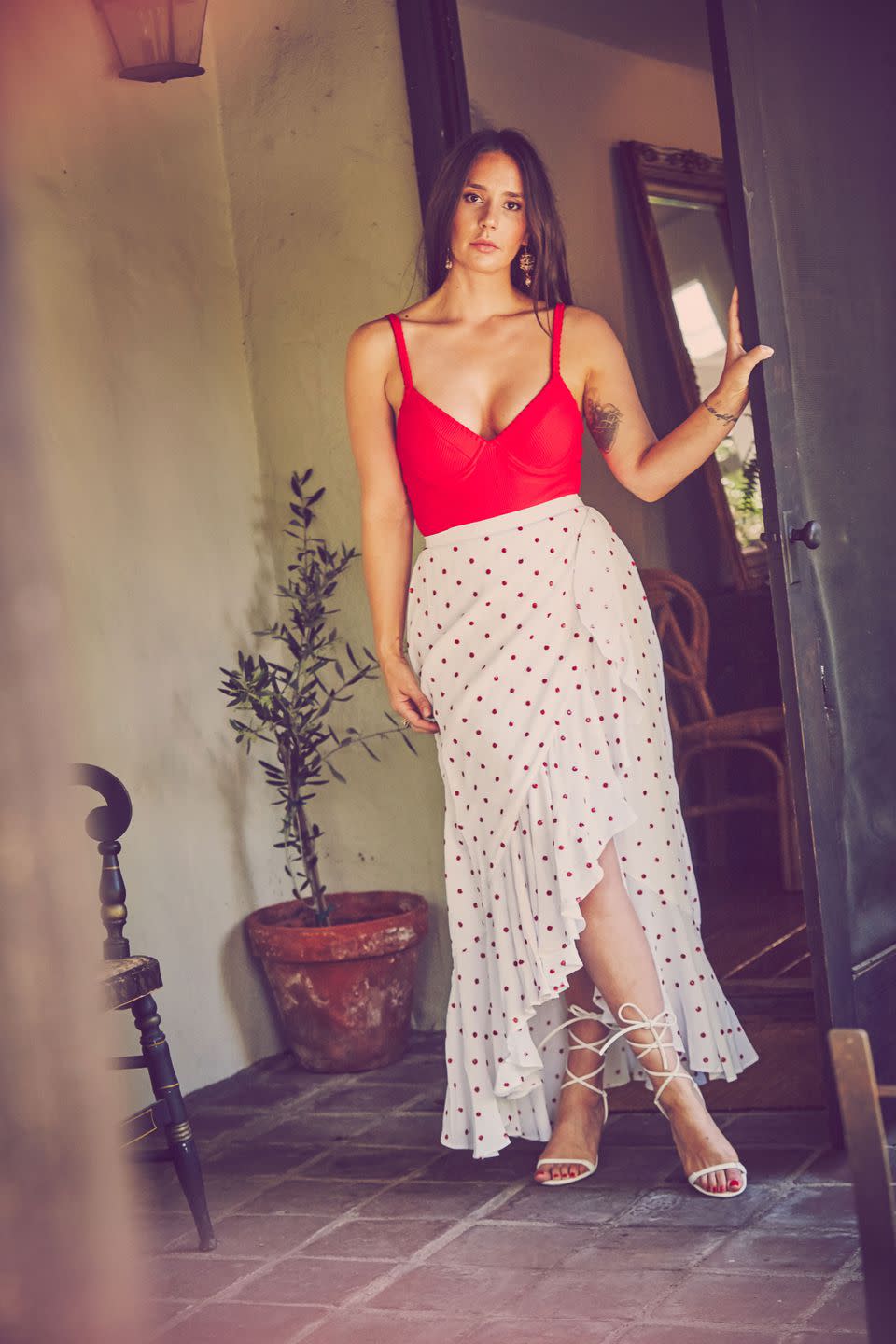
At a marketing meeting with the Revolve social media team, Pia and Revolve debate the merits of Pia’s involvement with LPA’s social handle. The corporate objective is for LPA to replicate the backend processes of Revolve’s other Instagram accounts, while preserving LPA’s signature voice. Stories perform better than grid posts, everyone agrees, and goal of three stories per week is set. “I don't want it to all of a sudden be like, ‘Blah, blah, blah, blah, we clearly had a marketing meeting,’” says Pia, warily.
Everyone is on board for more Pia content, except for Pia. It’s too self-obsessed, she argues. The brand’s name is already her initials. Does her face really need to keep reappearing, three years after launch?
“At the end of the day, it is a brand and we have to tell a story,” an assistant, Tavi, says passionately. “Why people want to buy an LPA blouse versus something else. You can’t just feed them new, cute stuff. We have to convince them to fucking buy this shit!”
Pia calls her marketing strategy “selling a vibe,” and everyone nods. In between posts about new arrivals, she suggests peppering stories “where you're like, 'I like that. I'd fuck with that brand. I do want to buy that blouse, because that girl's funny.'”
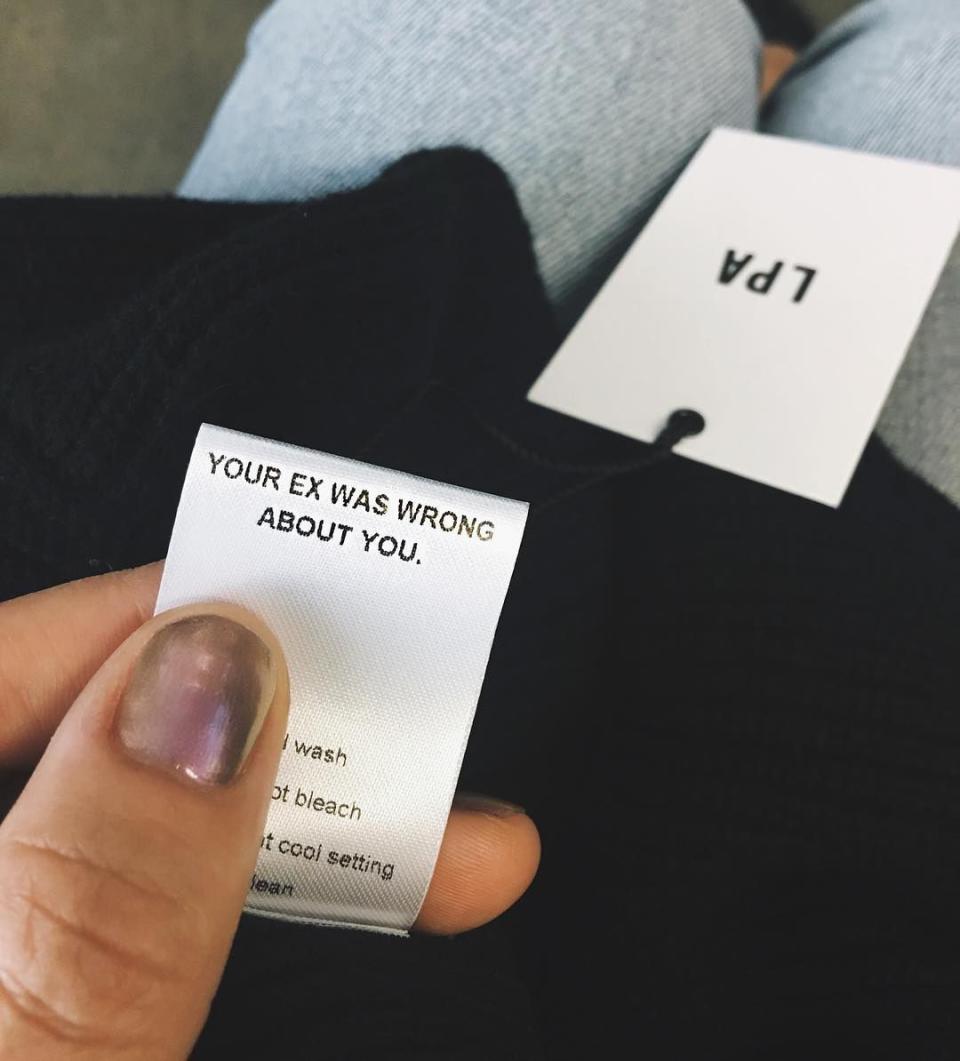
Pia was propelled to her position in culture in part by an uncanny ability to be herself online. But there is now a sense that if she is too much herself, she risks offending. Too little, and she could bore. One solution is a kind of meta-relatability, sharing about the difficulties of relentless sharing.
Later, the LPA account will post a meme of Ross from Friends, crying into a half-full margarita glass. “Dude, are you ok?” the first line asks, sarcastically. Around the same time, a selfie caption on Pia’s personal account seems to answer sincerely: “The moment you break down because you’re somehow supposed to be filling the internet with magical content but you’re just one human who doesn’t even have time to do her own laundry.”
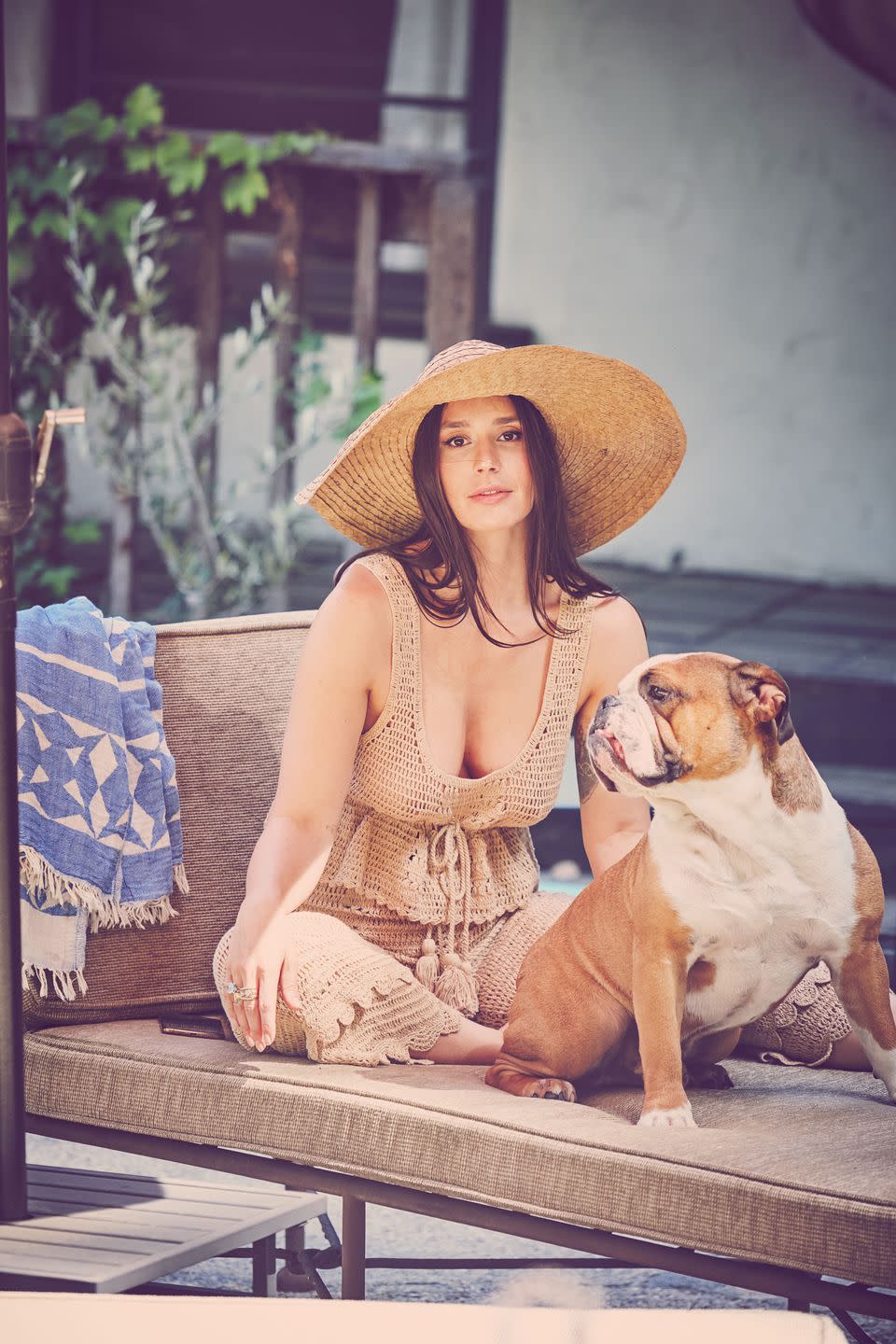
Back at the Revolve warehouse in Cerritos, we head to a swimwear shoot. Yumi, a Dutch-Japanese plus-size model whom Pia met on Instagram, poses in floral bralettes and striped bottoms, fan blowing through her hair. Someone hands the model a Starbucks cup, and Pia stops to consider the prop’s implications. “Is this promoting single-use plastic?” she wonders. The seashore vibes are nixed.
“Here's my whole thing,” Pia tells me. “Everybody's trying to fucking live their best life, and like, have a house, and have food, and have a kid, and be pretty and skinny, but also not too skinny, so you don't isolate people. And then you have a company, and you have to get your company to a billion dollars, and like, What round of funding are you on? But you’re also a woman, so you have to be a mom, and that shit gets so many likes. And your kid is cute but it also has to be like three different cultures...”
Pia takes a breath. “It's too much. We have to be so many things, all the time.” Her fashion motto is that life is hard enough: “So here’s some easy shit to throw on that you don’t have to think about.”
She’s in jeans and an LPA blazer, which she’ll keep on tonight for a dinner for the opening of the L.A. outpost of The Wing. There, she’ll hang out with Audrey Gelman and Sophia Amoruso, and other women who are beautiful and successful, but who, when that’s pointed out, say things like “I’m tired,” or “We're just putting sticks in the mud and seeing if they stand up,” according to Pia.
It bothers her. She wishes women would learn to take compliments for the things they do well.
You weren’t at the dinner. But the point is, you can relate. If fate aligns, and you work hard enough, and put everything out there, maybe you could be.
Photography by Chris Clinton.
('You Might Also Like',)

